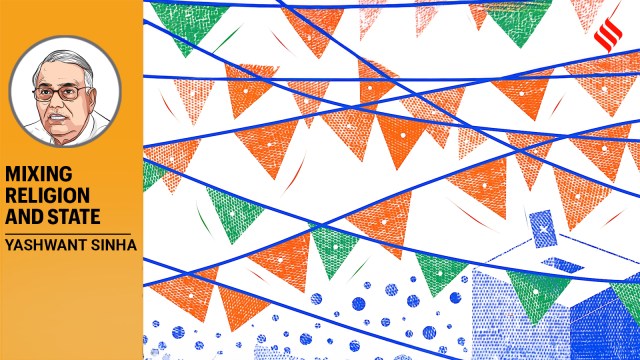
According to the Constitution, India is a secular state. This principle is enshrined in Articles 25 to 28. In other words, the state of India has no religion. It is required to treat all religions equally and cannot promote any religion. By incorporating these provisions in the Constitution, India established itself as a secular state without any ambiguity or doubt, though the word “secularism” was not mentioned in the Constitution. It was incorporated in the Preamble of the Constitution by the 42nd Amendment carried out during the Emergency. The validity of that amendment has recently been upheld by the Supreme Court of India. Though it was incorporated in the Constitution during the Emergency, it was not tainted as such.
India, therefore, is not and cannot be a theocratic state.
Let us now examine the state of secularism in India. In 1951, when Rajendra Prasad was the president of India and Jawaharlal Nehru was the prime minister, the temple at Somnath had been reconstructed and renovated and was ready for inauguration. Prasad was invited by the then rajpramukh of Saurashtra to inaugurate it. The president wrote a letter to the prime minister in which he said that he had been invited to preside over the opening function, and he did not see any objection to participating in it. Nehru wrote back to him the same day and said he did not like the idea of the president associating himself with a spectacular opening of the Somnath Temple. There was an exchange of correspondence between the two. Ultimately, Prasad prevailed.
Nehru had even objected to the then Saurashtra government making a provision of Rs 5 lakh for the inaugural function. A lot of what Nehru did is open to criticism but the fact remains that he was a committed secularist — he was against mixing religion with the state and wanted the Constitution to be followed both in its letter and spirit. The Maha Kumbh, which has just ended, was celebrated as an official event and not only the UP government but the Government of India backed it, participated in it and spent large sums of money on it. We have postponed the massive Census exercise for many years now. But the UP government seems to have counted every one of the crores of people who visited Prayagraj during the Kumbh.
What does this say about the state’s commitment to secularism? The state incorporates all organs of governance, including the legislature, the judiciary, the executive at all levels, and the media. All functionaries of state must, therefore, treat religion as a private affair and not make a public show of it. It would be tantamount to promoting it. Occupants of the high offices of state, in particular, must not do anything to show that they are promoting one particular religion. By this yardstick, the present situation in India leaves much to be desired. The executive in India is making a public spectacle of its religious beliefs and is seen as promoting one religion. Last year, photographs tweeted by the Prime Minister showed him at a pooja organised by the then chief justice of India.
Followers of other religions seem to have been effectively “othered”. Mosques are being dug up to find out if there were temples underneath and the names of some places have been changed because they seem to have an association with Islam. The government of the day forces us to live either in the past or in the distant future so that the pain of the present is not felt.
In case you think that I am saying all this because I am an agnostic, let me make it clear that I have a temple in my premises in Hazaribagh, Jharkhand and a pooja room in my house in the NCR. I regularly perform pooja and pray to my god every morning. There is a famous pilgrimage in Bihar-Jharkhand where pilgrims are required to pick up Ganga jal from Sultanganj in Bihar where the river flows northwards. The pilgrims pick up the water from the holy river there and carry it on their shoulders in a bamboo kanwar and cover a distance of more than 100 km to Deoghar, also known as Babadham, barefoot. I have undertaken this pilgrimage five times. At the same time, I am a fierce secularist.
Those in government often make their preference for one religion obvious. Will they go to a mosque and pray along with the other devotees during Eid or do the same for the Christians and other minorities in this country?
I do not know whether secularism is dead and India has finally become a Hindu Rashtra. But all those who believe in secularism and the Constitution seem to be in deep slumber.
The writer is a former Union external affairs minister and finance minister